Jacksonville has a secret park that provides a lot more than green space for sporting events and a place to walk the dog. Nestled in the heart of the historic Avondale neighborhood and bounded by pavement on all sides, Native Park provides a shady respite from the urban sprawl, a habitat for wildlife, and a place for residents of the city to learn about Florida’s diverse native plant species. Actually a pair of two small pocket parks, Native Parks I and II were set aside by the City as park lands over 100 years ago and are collectively referred to as simply “Native Park”. The Avondale Garden Circle helped establish the Park in 1923. They began planting native species there to increase public awareness of plants indigenous to north Florida.
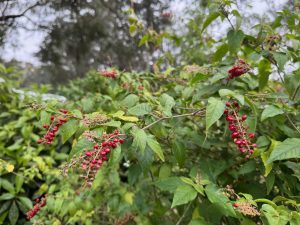
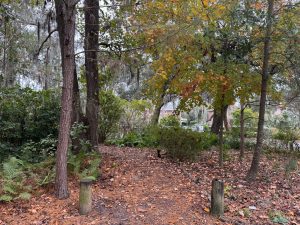
Over the years the park has seen many ups and downs. In 2010 Native Park I was adopted by the Ixia Chapter of the Florida Native Plant Society (FNPS) as part of the City’s Friends of the Park program to carry out the park’s original purpose and advance the mission of the FNPS. In early 2020 Ixia started working with the City and the park’s neighbors to extend its reach into Native Park II across the street. Now, over 125 native plant species are observed between the two plots.
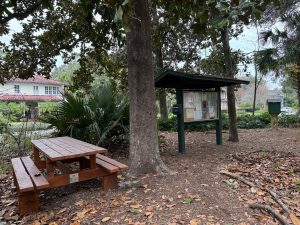
The success of this park is a true community effort.
The City’s Department of Public Works mows the small amount of grass on a monthly basis. Members of the FNPS as well as Duval County Master Gardeners and park neighbors hold volunteer workdays each month. During these workdays participants maintain the plethora of native plants.
From planting, pruning, weeding, and removal of invasive species, it takes teamwork and dedication to keep the park thriving. Beyond workdays to perform routine maintenance, volunteers lead tours for garden clubs and other organizations, conduct an annual native plant sale, host educational events for various groups and look for additional ways the park can help educate the public about using native plants in an urban environment.
Apart from the gardeners, the Scouts have also pitched in.
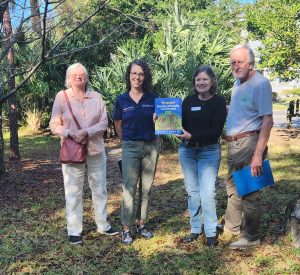
They built and donated an informational kiosk, a Little Free Library, and a picnic table–adding some great features for all visitors to enjoy.
Almost all of the Florida-Friendly Landscaping™ 9 Principles can be observed in action in this small space.
The Florida-Friendly Landscaping™ (FFL) Program recognizes landscapes that use sustainable landscaping practices which help to protect our precious water resources. They can take any form, from more traditional to more natural. The key factor in determining whether a landscape qualifies as Florida-Friendly lies in its design and maintenance practices. Recognitions are offered in three levels: Silver, Gold and Natural. All types of landscapes are assessed using a standardized checklist that aligns with FFL practices and the 9 guiding principles. FFL Natural level was introduced in June 2024. This is the first City of Jacksonville park to receive any FFL recognition. It is also one of the first landscapes in Duval County to receive Natural level recognition.
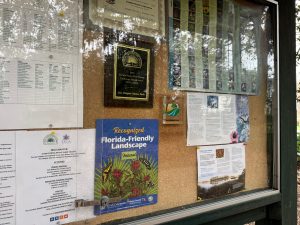
The caretakers of Native Park have demonstrated their dedication to conserving Florida’s water and natural resources by fulfilling a comprehensive set of criteria.
Among them are:
- Utilizing at least 75% native plant species
- Removal and management of all invasive and prohibited species
- Refraining from supplemental irrigation and fertilizers
- Fostering a diverse habitat for wildlife
The cornerstone principle of FFL is “Right Plant Right Place” and this would be impossible to achieve without the careful selection, placement and maintenance of plant material. Native plants offer superior ecosystem benefits to pollinators, birds, and other wildlife. Even on a short walk through, visitors can expect to see bees, butterflies, and birds enjoying the park, too.
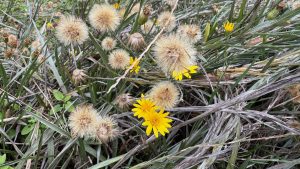
Plan a visit to Native Park I and II at 3306 Park Street, Jacksonville, and see for yourself!
Volunteering for an hour or two at the park is a great way to learn about native plants. See mature specimens and envision what might work best in your own yard. Individual plants are identified with metallic labels providing both botanical and common names. Interested in reducing irrigation, pesticide and fertilizer use in your yard by converting it to a Florida-Friendly Landscape? Contact UF/IFAS Extension Duval County at (904) 255-7450 or smeans1@ufl.edu to learn more!
 9
9
